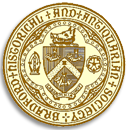Reverend William Scoresby DD
(First published in 1987 in volume 3, pp. 53-54, of the third series of The Bradford Antiquary, the journal of the Bradford Historical and Antiquarian Society.)
William Scoresby had little cause to remember his seven years in Bradford with affection. When he was inducted as vicar of the parish in 1839 he came, as he thought, to 'a noble field of Christian enterprise', but he left in 1847, a broken, disillusioned man. This former master whaler, with experience of handling the roughest crews, was pained and distressed by the gross and general rudeness of the people of Bradford. His less than robust health, which had survived the worst that arctic storms could do, gave way before a sea of troubles, and he tendered his resignation early in 1844. The Bishop of Ripon offered Dr Scoresby instead six months leave of absence, which he accepted and spent mainly in Canada and the United States. But the mood of despair returned and he resigned again in 1846, saying, 'The Lord sent me here for a great though painful work.'
Scoresby came to Bradford with the best of intentions at the worst of times: years of distress and discontent had led to great unrest in the town and 'a propensity for riot'. His plan to reorganize the parish was not well received and the dissenters resolutely refused to allow him to levy church rates. The opposition was interminable, but in other spheres his efforts gained support, particularly when he took up the cause of the poor and attempted to improve the social and moral conditions of factory workers. He built four day schools at no small expense and trouble to himself and gave a lead in drawing up proposals to rid the town of at least some of its smoke, pollution and bad housing. Meanwhile he continued to write and lecture on scientific topics, keeping in touch with eminent men of the day, including Prince Albert, who received him and tried out some of his magnetic experiments. But the immense demands of parochial work affected his eyesight, and his departure from Bradford was delayed at the very last by a severe attack of erysipelas which seemed to threaten his life. He left early in 1847 without a church to go to.
It is true that many of William Scoresby's troubles were of his own making, but this should not blind us to his long list of achievements. Bradford could make amends for its neglect by providing a suitable memorial, although not necessarily a statue, to this remarkable man; but soundings in official places show that among competing interests a project of that kind would not come first. Of course, we already have 'Scoresby Street', but mere names do not capture the imagination.
A spur to our intent has been given by Wilfred White, who points out that 5 October 1989 will be the bi-centenary of William Scoresby's birth, a most appropriate date for some form of commemoration. I hope that the Bradford Historical & Antiquarian Society, perhaps along with the Friends of Bradford Cathedral, the Bradford Branch of the Geographical Association and the Bradford Civic Society, will give a lead towards the formation of a committee, with the aim of examining all possibilities.
In this connection I am also grateful to Dr Kenneth Baker, the Honorary Archivist of Bradford Cathedral, for drawing my attention to 'William Scoresby, 1789-1857', a contribution to Geographers: Bibliographical Studies, Vol.4, 1980, by Bryan Waites. This article is in three sections:
- Education, life and work.
- Scientific ideas.
- Influence and spread of ideas.
There is a most useful bibliography, also in three sections:
- References on William Scoresby.
- Selective bibliography of works.
- Unpublished sources.
The work is rounded off by a chronological table in which the publications are set alongside important dates in Scoresby's life and career.
This is an excellent introduction to any study of William Scoresby and I hope that it may be possible, again with the help of others, to produce either a special 'Scoresby Number' of the Bradford Antiquary, or a commemorative booklet, in which the examination of some of these sources would playa part.
J.F.
© 1987, The Bradford Antiquary
